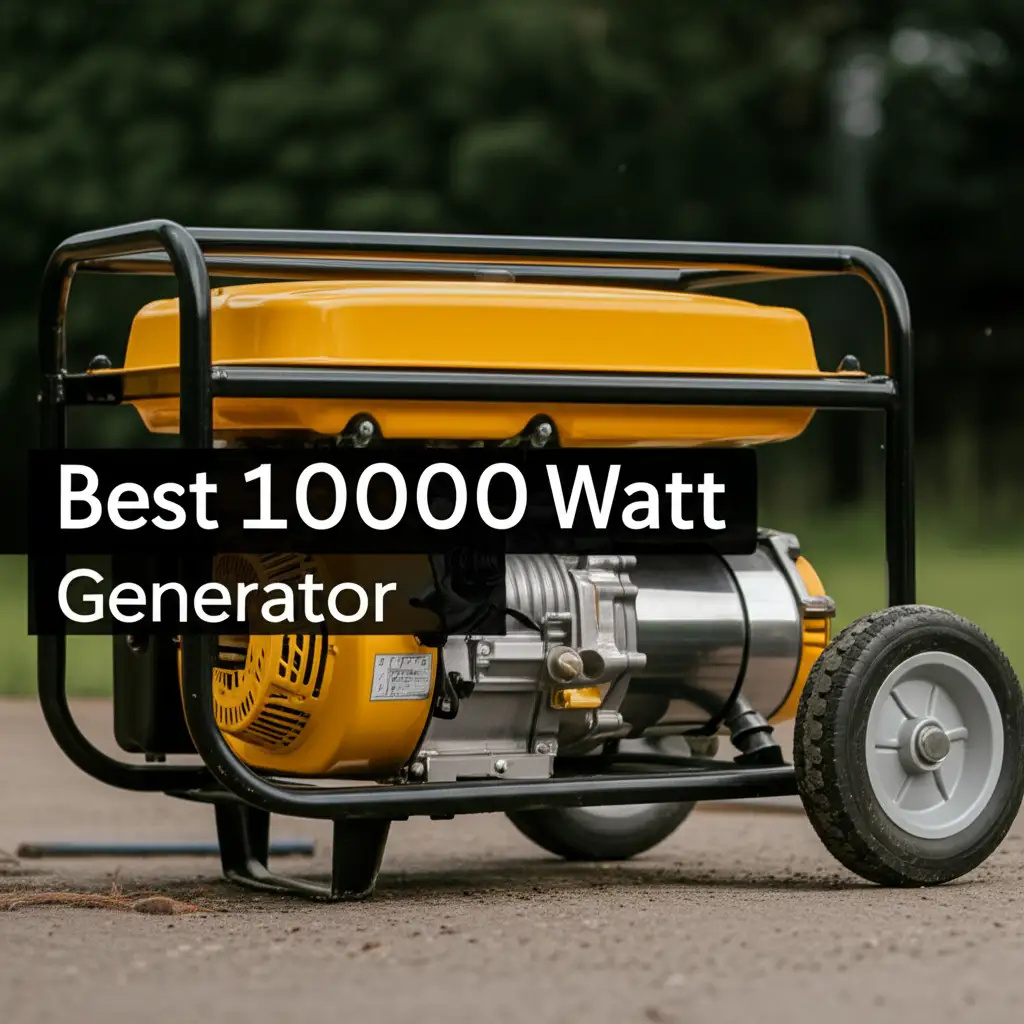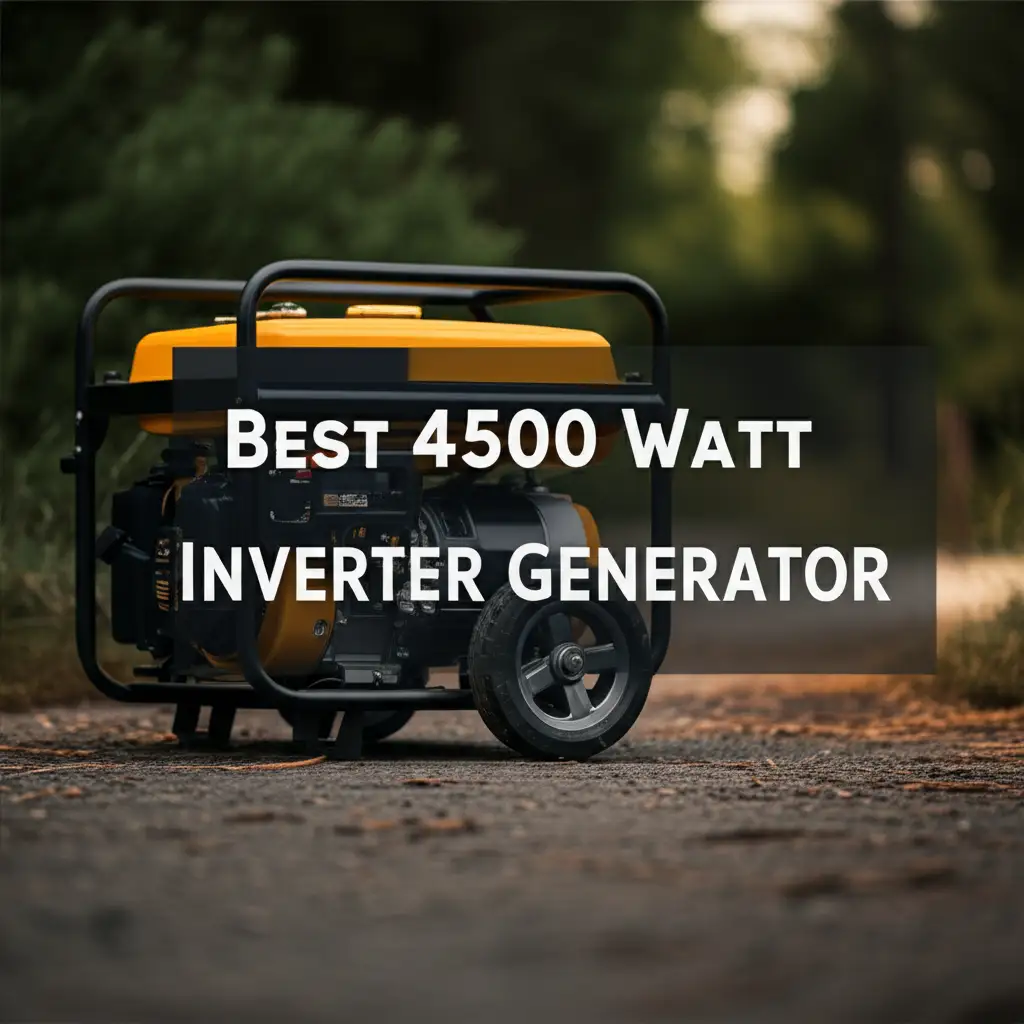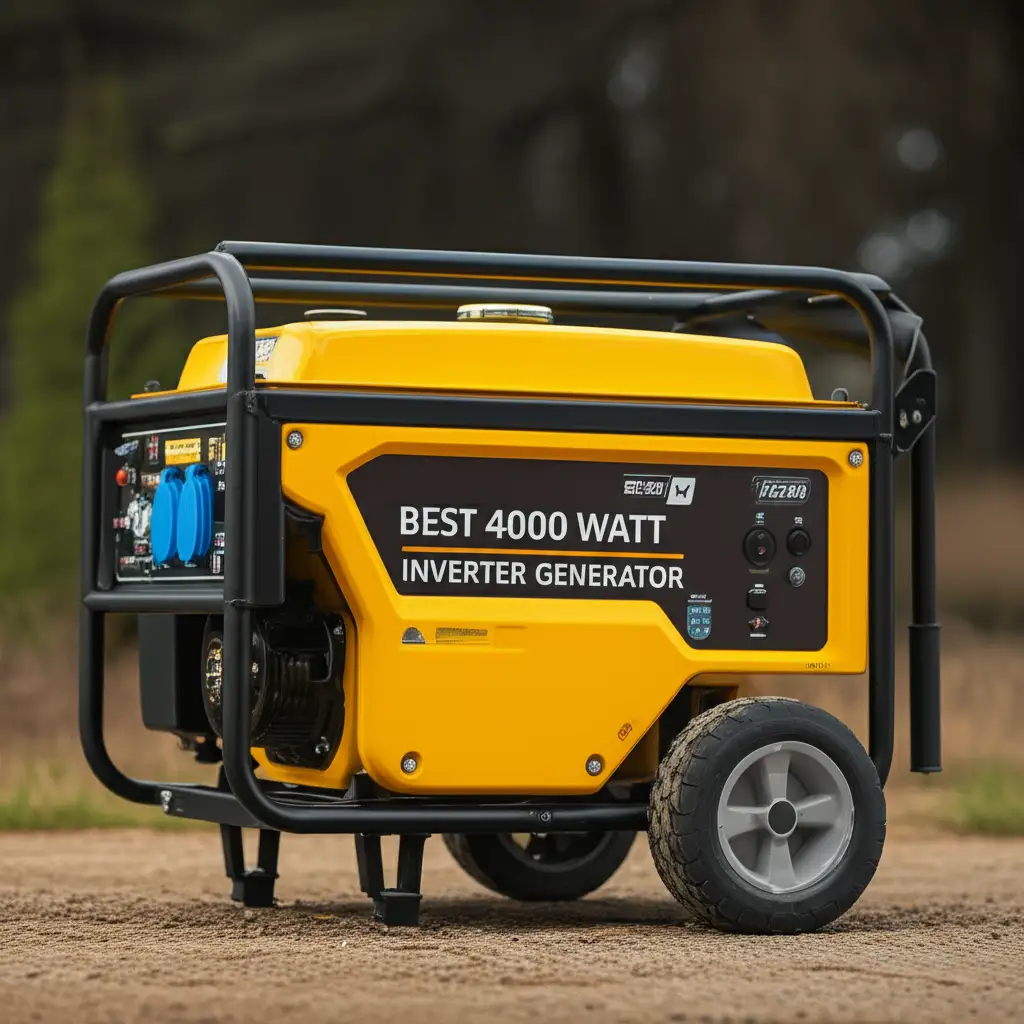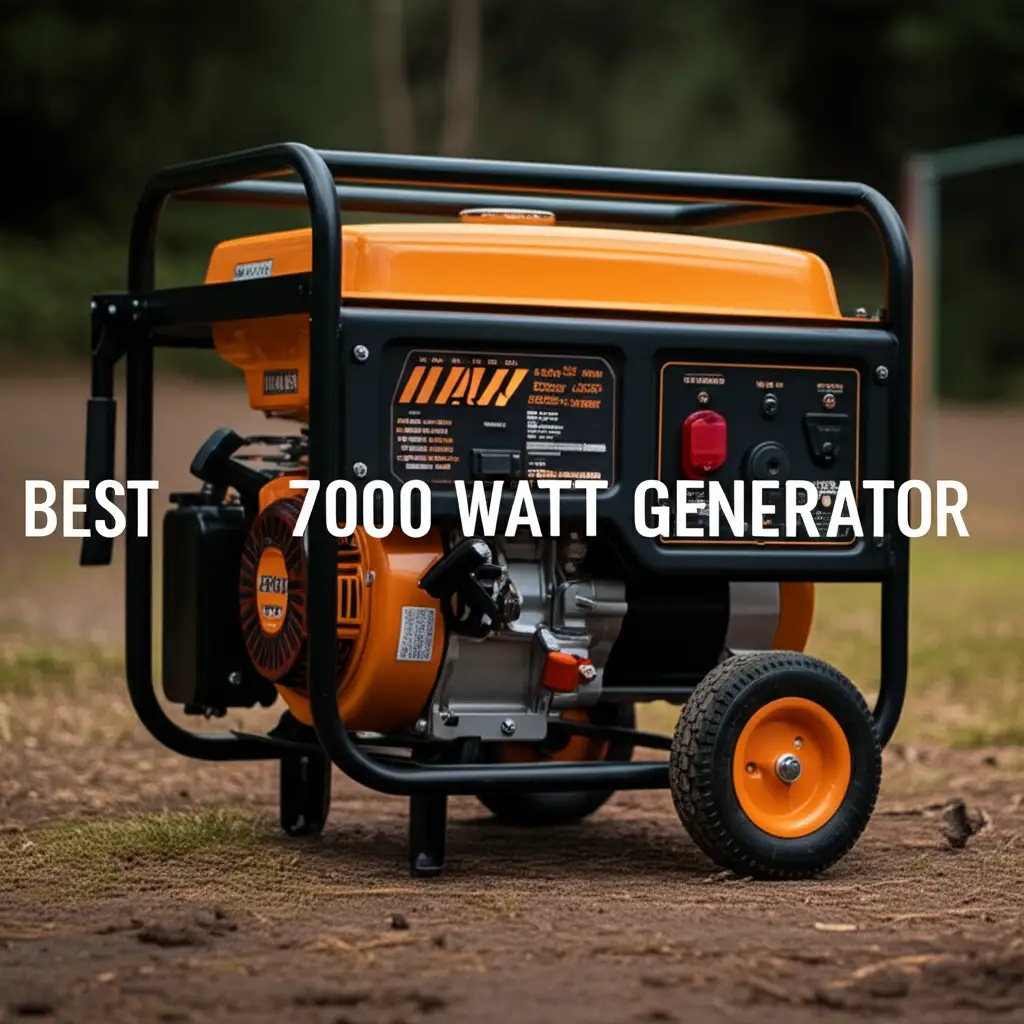· Elira Thomsen · Generators · 16 min read
Best 7500 Watt Generator
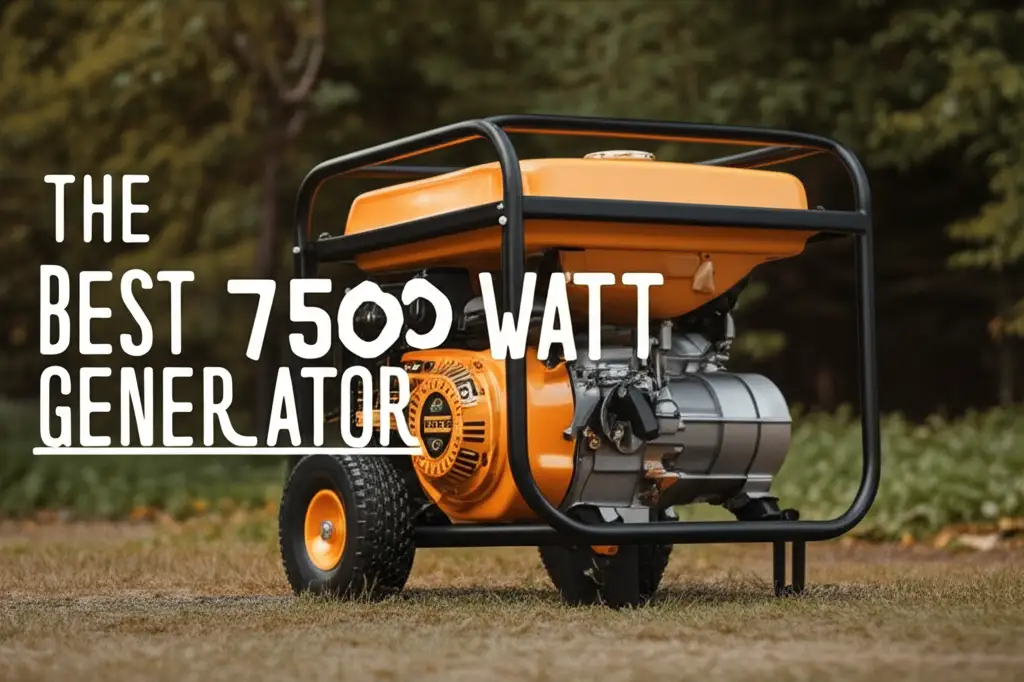
Unlock Reliable Power: Choosing the Best 7500 Watt Generator
Imagine the lights going out. Your refrigerator hums to a stop, and the air conditioning quits. Power outages are frustrating, whether caused by severe weather or unexpected grid issues. Many people face this problem, needing a dependable solution.
A 7500 watt generator offers significant power. It can keep essential home appliances running smoothly. This size provides a strong balance between power output and portability. We will explore why a 7500-watt generator might be perfect for your needs. We will also cover different types, key features, and maintenance tips to help you pick the best unit.
Takeaway
- Assess Your Power Needs: Determine what appliances you need to power to ensure a 7500-watt generator is suitable.
- Choose the Right Type: Select between conventional, inverter, or dual-fuel models based on your priorities like noise, fuel flexibility, or clean power.
- Prioritize Key Features: Look for electric start, multiple outlets, safety features, and a durable build for reliable operation.
- Maintain Regularly: Proper maintenance extends your generator’s life and ensures it runs when you need it most.
- Practice Safe Operation: Always use your generator outdoors and follow all safety guidelines to prevent accidents.
The best 7500 watt generator offers a robust solution for emergency home backup or demanding job site needs. It provides enough power to run critical appliances like refrigerators, lights, and furnaces, sometimes even small air conditioners. Look for models with reliable engines, convenient starting options, and essential safety features to ensure dependable operation.
Understanding 7500-Watt Generators: Powering Your Home
A 7500 watt generator is a powerful tool. It handles many tasks, from running your home during an outage to powering tools at a job site. This size offers a sweet spot for many users. It delivers substantial power without being excessively large or heavy.
Think about what you need to power. A 7500-watt generator can usually handle a refrigerator, freezer, sump pump, lights, and a few small electronics. It might even manage a window air conditioner or a furnace fan. Knowing your specific needs helps you choose the correct model. This power level makes it a popular choice for homeowners.
When discussing power, we often see two ratings: starting watts and running watts. Starting watts, also called surge watts, refers to the brief burst of power an appliance needs to start. Running watts is the continuous power needed to keep it operating. A 7500-watt generator typically offers around 7500 running watts and a higher starting wattage, perhaps 9000-9500 watts. This surge capacity is important. It ensures your generator can kickstart motors in appliances without tripping.
For example, a refrigerator might need 600 running watts but 2200 starting watts. A 7500-watt generator has plenty of capacity for this. This makes them versatile power sources. They are ready for various home and outdoor power needs. They also offer more flexibility compared to smaller units like a best 1000 watt generator.
Types of 7500-Watt Generators: Fueling Your Choice
When selecting a 7500 watt generator, you will find different types. Each type has specific advantages and disadvantages. Understanding these differences helps you make an informed decision. The main types include conventional, inverter, and dual-fuel generators.
Conventional Generators
Conventional generators are traditional models. They typically use a mechanical alternator to produce power. These generators are often more affordable for their power output. They are also known for being very robust. However, they can be louder than other types. They also produce “dirty power,” which means the electrical current might have more fluctuations. This “dirty power” is fine for most tools and major appliances. Sensitive electronics, like laptops or complex medical equipment, might need cleaner power.
Inverter Generators
Inverter generators use advanced electronic inverters. This technology converts raw power into a stable, clean sine wave. Clean power is crucial for sensitive electronics. Inverter generators are usually much quieter than conventional models. They are also more fuel-efficient because they can adjust engine speed based on the power demand. The main downside is their higher cost. While some smaller inverter generators exist, larger 7500-watt inverter models offer substantial power with quiet operation.
Dual-Fuel Generators
Dual-fuel generators offer flexibility. They can run on two different fuel types. Most commonly, they use gasoline and propane. This flexibility is a significant benefit. If one fuel type is unavailable, you can switch to the other. For instance, propane stores well for long periods without degrading. Gasoline is readily available at most gas stations. This type of generator provides great convenience, especially during extended power outages. It also adds a layer of security, as you are not reliant on a single fuel source.
Choosing the right type depends on your priorities. If budget is key and noise is not an issue, a conventional model might work. If quiet operation and clean power are vital, an inverter is better. If fuel flexibility is paramount, a dual-fuel generator is an excellent choice. Compare these options carefully before you buy. For even larger power needs, you might consider stepping up to a best 10000 watt generator or even a best 12000 watt generator.
Key Features for the Best 7500-Watt Generator
When you are looking for the best 7500 watt generator, certain features stand out. These features boost convenience, safety, and performance. Paying attention to these details helps ensure you get a reliable unit. I always recommend reviewing these specifics before making a purchase.
Starting Mechanism
Consider how the generator starts. Manual recoil start requires pulling a cord, which can be hard for some people. Electric start offers much easier operation. You simply push a button. Some generators even come with a remote start feature. This lets you start the generator from inside your home. An electric start is a highly desirable feature for convenience and ease of use.
Fuel Tank Size and Run Time
The size of the fuel tank directly affects run time. A larger fuel tank means longer operation without needing to refuel. For emergency backup, longer run times are very beneficial. You want a generator that can power your essentials for many hours on a single tank. Check the estimated run time at half load to get a realistic idea. This helps you plan for fuel storage.
Outlets and Receptacles
Look at the types and number of outlets provided. A good 7500 watt generator should have various outlets. This includes standard 120V household outlets (5-20R). It should also have a 120/240V twist-lock outlet (L14-30R). This larger outlet is essential for connecting to your home’s transfer switch. Some models also include a 30A RV outlet (TT-30R) or a 50A 120/240V outlet for high-power needs. Ensure the outlets match your intended use.
Safety Features
Safety is paramount when operating a generator. Important safety features include low-oil shutdown. This feature automatically turns off the engine if the oil level drops too low. This prevents serious engine damage. Overload protection is another crucial feature. It prevents damage to the generator and connected appliances by tripping a breaker if too much power is drawn. GFCI (Ground Fault Circuit Interrupter) outlets also offer protection. They prevent electrical shock. A spark arrestor is also necessary for preventing wildfires. These features give you peace of mind.
Noise Level
Generators can be noisy. Noise levels are measured in decibels (dB). A lower decibel rating means a quieter generator. Inverter generators are typically much quieter than conventional models. If noise is a concern, especially if you have close neighbors, check the decibel rating carefully. Some 7500-watt generators can be surprisingly quiet for their power output.
By focusing on these key features, you can select a 7500 watt generator that provides reliable, safe, and convenient power. This ensures you are ready when power is most needed.
Calculating Your Power Needs: Is 7500 Watts Enough?
Before buying any generator, you must calculate your power requirements. This ensures the generator you choose meets your actual needs. A 7500 watt generator is a significant investment. You want to be sure it can handle what you plan to power. I found that many people overestimate or underestimate their needs, which leads to issues.
Start by listing all the appliances you want to run simultaneously during a power outage. Think about essential items first. These might include your refrigerator, freezer, lights, and a well pump or furnace fan. For each item, find its running watts and starting watts. These ratings are usually on a label on the appliance itself or in its owner’s manual.
- Running Watts: This is the power an appliance uses continuously.
- Starting Watts (Surge Watts): This is the extra power an appliance needs for a few seconds to start up. Motorized appliances, like refrigerators or air conditioners, have higher starting watts.
Once you have your list, add up the running watts for all items you want to power. This gives you your total continuous power need. Then, identify the single appliance with the highest starting watts. Add this highest starting wattage to your total running watts. This sum is your maximum starting power requirement.
For example, if your total running watts for essentials is 4000 watts, and your refrigerator has the highest starting watts at 2000 watts, your total starting power need would be 6000 watts. A 7500 watt generator with a higher surge capacity (e.g., 9000-9500 starting watts) would be more than sufficient.
Consider your future needs too. Do you plan to add more appliances later? Will you use the generator for recreational activities, like RV camping? Knowing these factors helps you decide if 7500 watts is sufficient. If your needs are much higher, you might need to look at a best 13000 watt generator or even larger. Conversely, if your needs are minimal, a smaller unit like a best 1500 watt solar generator might suffice for specific items.
Maintenance Tips for Your 7500-Watt Generator
Proper maintenance extends the life of your 7500 watt generator. It also ensures the generator is ready when you need it most. Neglecting maintenance can lead to breakdowns and costly repairs. I always follow these steps to keep my generator in top condition.
Regular Oil Changes
Just like your car, your generator needs regular oil changes. Refer to your owner’s manual for the recommended intervals. Typically, the first oil change is needed after 20-50 hours of use. Subsequent changes are often recommended every 100 hours or annually. Using the correct type of oil, such as best 10w30 oil for generator, is vital. Fresh oil lubricates engine parts and prevents wear.
Check and Clean the Air Filter
A clean air filter is crucial for engine performance. A dirty filter restricts airflow, which can reduce efficiency and power output. Inspect the air filter regularly, especially if operating in dusty conditions. Clean it according to the manufacturer’s instructions. Replace it if it is heavily soiled or damaged.
Inspect Spark Plug
The spark plug is essential for engine ignition. Check it periodically for signs of wear or carbon buildup. A fouled or worn spark plug can cause starting problems or misfires. Clean any buildup or replace the plug as needed. Ensure the gap is set correctly.
Fuel System Care
Fuel can go bad over time. Stale fuel can clog the carburetor and fuel lines. Always use fresh fuel. If storing the generator for an extended period, use a fuel stabilizer or drain the fuel tank. This prevents common fuel-related issues. For dual-fuel models, remember to manage both fuel types properly.
Battery Maintenance (for Electric Start)
If your 7500 watt generator has an electric start, it uses a battery. Check the battery terminals for corrosion. Keep them clean and tight. Consider using a trickle charger if the generator is stored for long periods. This keeps the battery charged and ready. A dead battery means your electric start feature will not work.
General Cleaning and Storage
Keep your generator clean. Wipe down the exterior after use to remove dirt and debris. Store the generator in a dry, well-ventilated area. Protect it from extreme temperatures and moisture. Using a generator cover can also help protect it from the elements. Following these maintenance steps helps ensure your 7500 watt generator remains reliable for years.
Safety First: Operating Your 7500-Watt Generator Safely
Operating a 7500 watt generator requires strict adherence to safety guidelines. Generators produce carbon monoxide, a colorless, odorless, and deadly gas. They also involve electricity and flammable fuels. Following safety protocols prevents accidents and ensures safe operation.
Outdoor Use Only
This is the most critical rule. Always operate your generator outdoors. Place it far away from windows, doors, and vents. Ensure there is plenty of open space around the unit for proper ventilation. Never run a generator inside a garage, shed, basement, or any enclosed area. Even open windows and doors are not enough to prevent carbon monoxide buildup. Carbon monoxide detectors are a good backup but not a substitute for outdoor operation. I always make sure my generator is at least 20 feet from my house.
Proper Grounding
Generators must be properly grounded to prevent electrical shock. Consult your owner’s manual for specific grounding instructions. This usually involves connecting a grounding rod to the generator’s frame. This safely dissipates any stray electrical current. Skipping this step can be extremely dangerous.
Use Appropriate Extension Cords
Use heavy-duty, outdoor-rated extension cords. Ensure the cords have the correct gauge for the power load. Undersized cords can overheat and cause fires. Never use frayed or damaged cords. If connecting the generator to your home’s electrical system, always use a transfer switch. A transfer switch prevents backfeeding electricity onto utility lines, which can injure utility workers.
Fuel Handling and Storage
Gasoline and propane are highly flammable. Store fuel in approved containers. Keep them away from the generator and any ignition sources. Never refuel a hot or running generator. Allow the generator to cool down before adding fuel. Spilled fuel on a hot engine can easily ignite. Keep fire extinguishers nearby when operating or refueling your generator.
Keep Children and Pets Away
Maintain a safe distance around the generator. The hot engine and exhaust can cause severe burns. Moving parts are also a hazard. Always supervise children and pets to ensure they stay clear of the operating unit.
Regular Inspections
Before each use, perform a quick visual inspection. Check for loose wires, fuel leaks, or any damage. Ensure all connections are secure. If you notice any issues, do not operate the generator until they are resolved. Taking these precautions ensures the safe and effective use of your 7500 watt generator.
Top Considerations When Buying Your 7500-Watt Generator
When you are ready to purchase the best 7500 watt generator, several factors become crucial. Thinking through these points helps you make a choice you will be happy with. I considered each of these when I picked my own unit.
Brand Reputation and Warranty
Choosing a reputable brand offers peace of mind. Established brands often have better quality control and more reliable customer support. Research brand reviews and look for companies known for durability and performance. A strong warranty indicates the manufacturer stands behind their product. Look for warranties that cover parts and labor for a reasonable period. This protects your investment.
Portability and Storage
Even a 7500-watt generator can be heavy. Consider its weight and the presence of wheels and handles. A sturdy wheel kit makes moving the generator much easier, especially if you plan to use it in different locations. Think about where you will store the generator. Ensure you have enough space in a dry, well-ventilated area. Some models are more compact than others.
Emissions and Environmental Impact
Generators, especially conventional ones, produce exhaust emissions. Some states have stricter emission standards, like California’s CARB compliance. If environmental impact is a concern for you, or if you live in an area with such regulations, check for compliant models. Inverter generators often have lower emissions due to their fuel efficiency.
Cost vs. Features
Generator prices vary widely based on features, brand, and type. While a basic 7500-watt conventional generator might be more affordable, it might lack features like electric start or quiet operation. An inverter or dual-fuel model will typically cost more. Balance your budget with the features you need most. Do not compromise on essential safety features to save a few dollars. Investing in quality usually pays off in reliability and longevity.
Availability of Parts and Service
Consider how easy it is to get replacement parts or professional service for the generator. Brands with wide dealer networks or readily available parts online can be a huge benefit down the road. If something breaks, you want to fix it quickly. This ensures your generator is always ready when needed.
By evaluating these top considerations, you can confidently select the best 7500 watt generator. It will meet your power requirements and provide reliable performance for years to come.
FAQ Section
Q1: What can a 7500 watt generator run in a house?
A 7500 watt generator can power many essential household items. It typically handles a refrigerator, freezer, sump pump, lights, and a few small electronics. It can often run a furnace fan or a window air conditioner as well. This makes it a great choice for keeping your home comfortable during an outage.
Q2: How long can a 7500 watt generator run on a tank of fuel?
The run time depends on the fuel tank size and the load on the generator. A typical 7500 watt generator with a 6-7 gallon fuel tank might run for 8-12 hours at a 50% load. Higher loads consume fuel faster. Always check the manufacturer’s specifications for exact run times.
Q3: Are 7500 watt generators very noisy?
Noise levels vary by generator type. Conventional 7500 watt generators can be quite noisy, often around 70-75 decibels. Inverter models of similar wattage are much quieter, sometimes as low as 60-65 decibels. If noise is a concern, consider an inverter generator for quieter operation.
Q4: Do 7500 watt generators need a transfer switch?
Yes, if you plan to connect your 7500 watt generator directly to your home’s electrical system, a transfer switch is mandatory. This switch isolates your home from the utility grid. It prevents dangerous backfeeding of power, which can injure utility workers or damage appliances. A transfer switch ensures safe and legal connection.
Q5: Can a 7500 watt generator power an RV?
Absolutely, a 7500 watt generator is more than capable of powering most RVs. It provides enough power to run air conditioners, microwaves, and other appliances simultaneously. Many larger RVs require generators in this wattage range for full functionality. Ensure the generator has the correct RV-specific outlet (TT-30R or 14-50R).
Q6: How often should I run my 7500 watt generator for maintenance?
It is recommended to run your generator for 15-20 minutes every month or every few months. Do this with a light load connected. This keeps the engine lubricated, circulates fuel, and recharges the battery. Regular exercise ensures the generator starts easily when you need it most.
Conclusion
Choosing the best 7500 watt generator means finding the right balance of power, features, and reliability. We have covered key aspects, from understanding different types to crucial safety measures. This wattage offers a robust solution for most home backup needs or demanding job site applications. I hope this guide helps you in your selection process.
Remember to assess your power needs carefully and prioritize features like electric start and proper safety mechanisms. Regular maintenance will ensure your generator is ready whenever an outage occurs. Investing in a quality 7500 watt generator provides peace of mind. It keeps your life running smoothly, even when the power goes out. Do not wait for an emergency; prepare now to secure your power supply.


